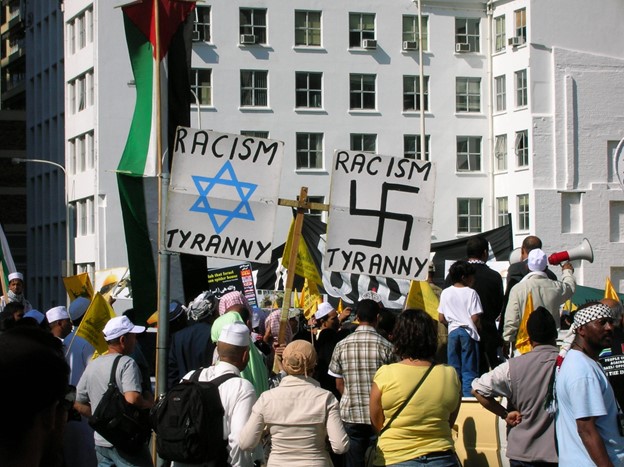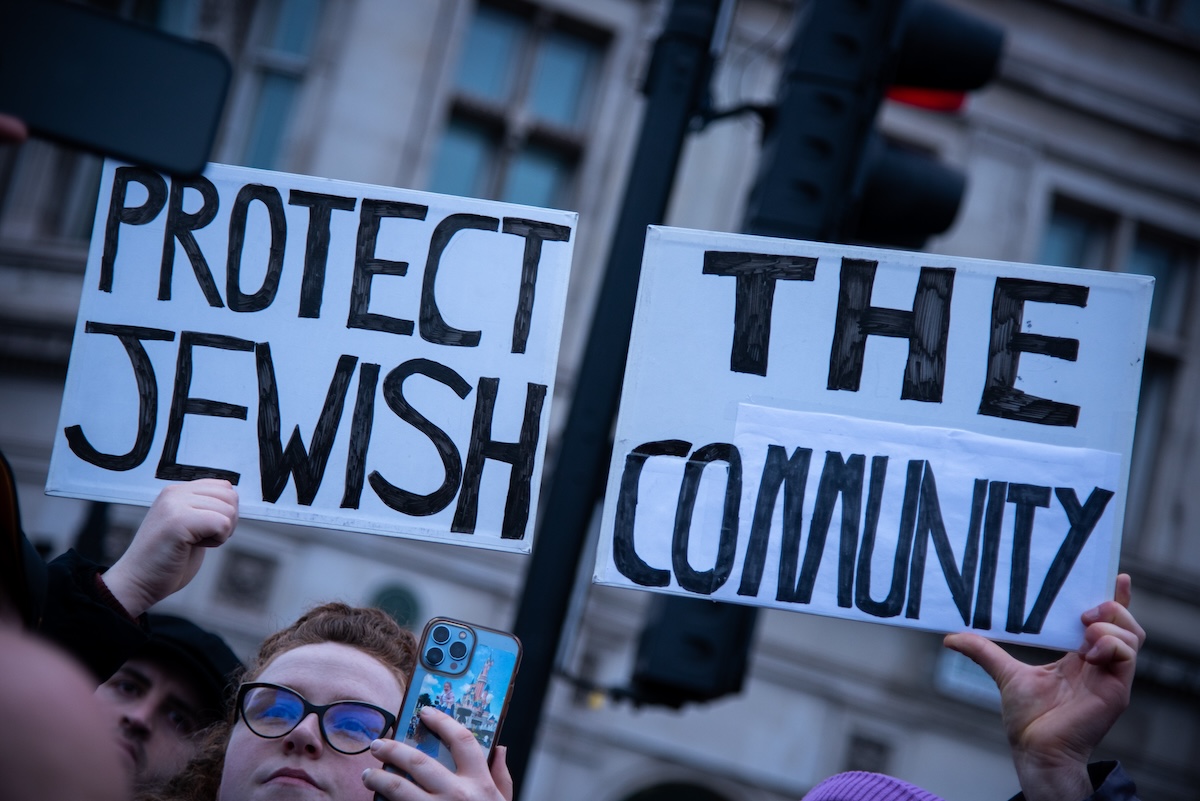Israel’s existential danger has moved beyond its borders

Israel needs to treat the battle against antisemitism like the eighth front that it is: a strategic fight that demands real resources, a clear doctrine, and the urgency of a national security priority before it is too late.
According to a new report by Combat Antisemitism, there were 168 antisemitic incidents recorded worldwide just last week by its Antisemitism Research Center. These included the vandalization of a synagogue in Toronto, a campaign launched by a Danish political party urging voters to "Free Copenhagen from Zionism," and a business owner in Melbourne who refused to hire an Israeli woman and said she hoped the woman would leave the city soon.
And the list keeps growing. Most recently, a Neo-Nazi rally was held outside the New South Wales Parliament in Australia, a chilling reminder of how openly hate is surfacing in Western democracies.
Although the fragile ceasefire between Hamas and Israel is holding for now under American pressure, the existential threat of the eighth front has not eased, and almost certainly will not go away.
For more than two years, Israel has dedicated its army and its reserves to fighting seven physical fronts and, in many ways, has succeeded. But when it comes to the battlefield of antisemitism, Israel and the Jewish people are losing ground. This is not a public relations war. This is a war for the future of the Jewish people, the State of Israel, and ultimately humanity and freedom.
And make no mistake: the end of the Hamas-Israel war will not end the campaign on the eighth front. The vicious tsunami of antisemitism that has swept across the world in recent years has not subsided. On the contrary, it has been unleashed, normalized, and embedded in ways we can no longer afford to ignore.
According to Michal Cotler-Wunsh, CEO of the International Legal Forum (ILF) and Israel's former Special Envoy for Combatting Antisemitism, Israel's ability to fight the eighth front will ultimately determine its ability to fight on all the others.
"It will, of course, dictate the way that Jews and Zionists, anybody believing in Israel's right to exist, may live," Cotler-Wunsh said. "Because you don't need to be a Jew to be the target of this pernicious form of an ever-mutating, lethal virus, anti-Zionism. You just need to believe in Israel's right to exist. Anti-Zionism is not criticism of Israel, just as antisemitism is not criticism of Jews. Anti-Zionism is the denial of Israel's very right to exist. So by definition, it is an existential threat to the Jewish nation state."

Cotler-Wunsh told All Israel News that the Jewish people must "see the writing on the wall" and recognize that they have no choice but to fight this war in the most comprehensive way possible, as a people, and together with allies around the world.
The normalization of antisemitism has reached such an extreme that politicians can now win votes on the back of it. Earlier this month, an anti-Zionist candidate, Zohran Mamdani, won the mayoral race in New York City. In Cotler-Wunsh's estimation, he did not win "despite" his antisemitic views. For many voters, she said, he won because of them.
"I don't think antisemitism is going away anywhere," Cotler-Wunsh continued. "I actually think we need to prepare ourselves in that sense for the normalization of antisemitism, for it's becoming acceptable once again."
She added that the normalization of antisemitism intersects with, and fuels, a broader normalization of extremism – whether it comes from the right, the left, or Islamist movements.
Here, the lines between ideological extremism and antisemitic hatred blur into one combustible force, and that force is spreading.
So what does it look like to prepare strategically?
The first step, she said, is recognizing that this is a war, not a PR problem.
"We don't fight wars by doing good PR and branding. We fight wars by using the tools that have been weaponized."
This includes legal tools utilized in international courts and organizations, such as the United Nations. It means pushing to ensure that the International Holocaust Remembrance Alliance (IHRA) definition of antisemitism is accepted and upheld by states and countries. It means focusing not only on specific organizations but on all "spaces and places," she explained – academic institutions, formal and informal education, online platforms, as well as international institutions and agencies. It means taking the battle to the streets and to the digital sphere.

There will not be one single weapon. Instead, a new arsenal must be created and adapted for each of these different arenas.
She also warned that the Jewish people cannot continue to be caught off guard – "surprised over and over again" – as the threat intensifies.
Cotler-Wunsh added that Jews will not be able to escape this wave of hatred.
Jews who try to shed their Judaism, assimilate, or distance themselves from Israel will still be targeted, she said. It didn't work during World War II and the Holocaust, and it will not work now. In fact, when Jews attempt to detach from their own identity and religion, they often become even more of a target.
“Just as in the past Jews who shed their religion were not immune, today, Jews who shed their Zionism are not going to have an insurance policy,” Cotler-Wunsh said.
This new reality will force a paradigm shift, the beginnings of which we are already seeing. While the eighth battlefront is tied to anti-Zionism, it will not be fought on Israel's shores, but primarily in the Diaspora. The State of Israel will, therefore, increasingly become the anchor and support system for Jews living abroad.
In other words, the front line is global, and Israel's responsibility is widening, not shrinking.
This week, over a hundred people attended a solidarity rally at Tel Aviv University in support of Australian Jews. At least a third of the participants were native Israelis who came out to show support for a community deeply shaken by antisemitism.
Historically, solidarity rallies have been moments when the Diaspora stood with Israel. But that historic pattern is reversing. Now Israel will need to stand with the Diaspora.
Jews must wake up to the reality that the same manifestations of hate that Israel faced on Oct. 7, 2023, are appearing in Australia, Canada, Sweden, and across the globe. It may not always be guns and knives – though sometimes it will – but it is the same challenge, the same war, the same lethal hatred aimed at destroying a people.
The fire Israel and Diaspora Jews are experiencing is fueled by the same source.
That brings us back to the central, unavoidable truth: The eighth front is on fire. It threatens Jews everywhere with the same lethal intent as the other seven fronts Israel has been fighting on and near its borders.
If we fail to win the eighth front, if we fail to win the war of ideas, identity, and legitimacy, then the rest of our victories won’t save us.

Is All Israel News’ faithful reporting important to you? Be part of it—help us continue by becoming a $5/month supporting partner.
.jpg)
Maayan Hoffman is a veteran American-Israeli journalist. She is the Executive Editor of ILTV News and formerly served as News Editor and Deputy CEO of The Jerusalem Post, where she launched the paper’s Christian World portal. She is also a correspondent for The Media Line and host of the Hadassah on Call podcast.
You might also like to read this:

















